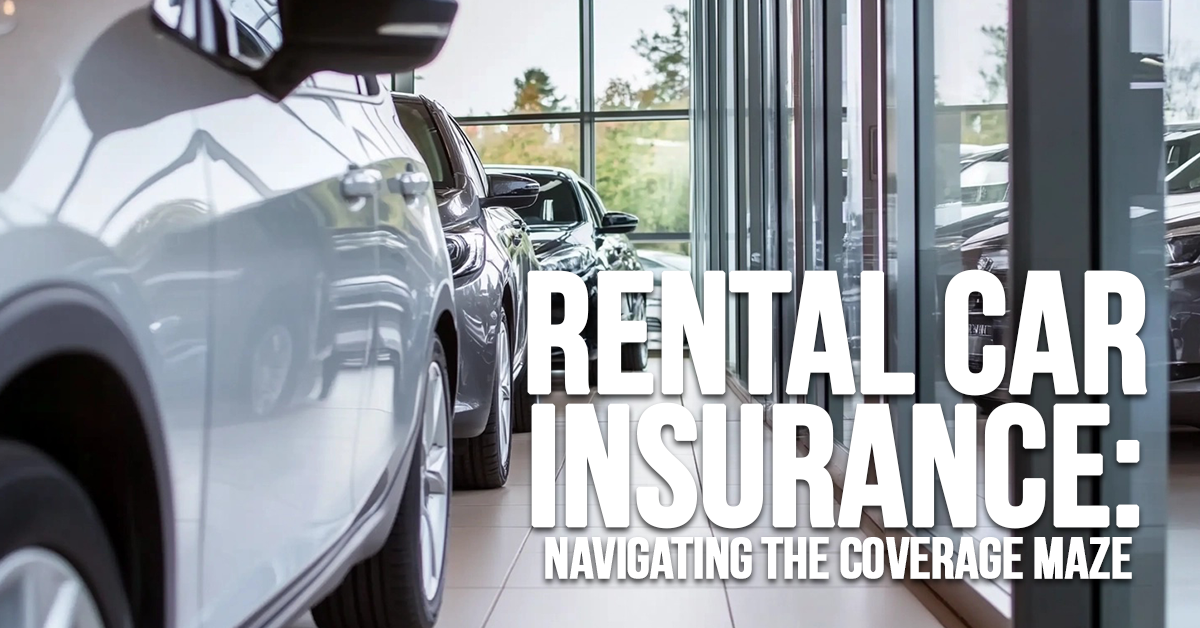Rental Car Insurance: Navigating the Coverage Maze

Rental Car Insurance: Navigating the Coverage Maze
Renting a car can be a convenient and enjoyable experience. However, it’s crucial to understand your insurance coverage before hitting the road. Many drivers are unsure whether their personal auto insurance covers rental cars and often find themselves bombarded with offers for supplemental insurance from the rental car company.
Do You Need Rental Car Insurance from the Rental Company?
The answer depends on your personal auto insurance coverage.
- If you have full coverage (comprehensive and collision) on your personal vehicle: Your personal insurance policy will typically cover the rental car in the event of an accident, with the same deductibles that apply to your personal vehicle.
- If you only have liability coverage: Your personal insurance will only cover damage you cause to another vehicle or property. You will be responsible for any damage to the rental car.
Credit Card Coverage:
Many credit cards offer some form of rental car insurance as a benefit. However, coverage varies significantly between cards. It’s crucial to review your credit card agreement carefully to understand the specific terms and conditions of your coverage.
Rental Car Company Insurance:
Rental car companies offer various insurance options, including collision damage waiver (CDW) and loss damage waiver (LDW). These options can be expensive, often exceeding $30 per day.
Key Considerations:
- Loss of Use Coverage: Your personal auto insurance may not cover the rental car company’s loss of use fees, which are charged when the rental car is out of service for repairs.
- Personal Belongings: Your personal belongings may be covered under your homeowners or renters insurance, but there may be limitations on the amount of coverage.
- Non-Owner Auto Insurance: If you don’t own a car but rent frequently, consider purchasing non-owner auto insurance, which provides liability coverage for any vehicle you drive.
Comparing Rates is Crucial:
Before renting a car, it’s essential to compare your personal auto insurance coverage, credit card benefits, and the rental company’s insurance options. This will help you determine the most cost-effective and comprehensive coverage for your needs.
Conclusion:
Understanding your rental car insurance options is crucial to avoid unexpected costs and ensure you are adequately protected. By carefully reviewing your personal auto insurance policy, exploring credit card benefits, and comparing rental company insurance options, you can make informed decisions and enjoy a safe and worry-free rental experience.
Disclaimer: This article provides general information and should not be considered insurance or financial advice.
Do you have questions about your insurance? Find an insurance agent near you with our Agent Finder
Search All Blogs
Search All Blogs
Read More Blogs
The Ultimate Spring Cleaning: Why March is the Month to Audit Your Life Insurance Beneficiaries
Don’t just clean your closets this March. Ensure your life insurance beneficiaries are up to date to protect your family’s future.
March Potholes: Is Your Collision Coverage Ready for the “Crater Season”?
Road craters are appearing everywhere this March. Discover the insurance math behind pothole damage and how to keep your premiums from spiking.
Spring Skies and Structural Eyes: Why a March Roof Check is Your Best Insurance Policy
Don’t wait for a leak to check your roof. Learn how to spot late-winter damage and protect your home’s structure this March.
The Mystery of the Plastic Baby: A Guide to Mardi Gras and the King Cake
Why is there a baby in the cake? Discover the history and traditions of Mardi Gras 2026 and the delicious mystery of the King Cake.
Let the Good Times Roll—Safely: Mardi Gras Liability for Your Business
Hosting a Mardi Gras party this Tuesday? Make sure your business has the right event liability and liquor coverage before the beads start flying.
The Business “Prenup”: Why Business Partners Need Life Insurance in February
Love your business partner? Protect your company with a Life Insurance-funded Buy-Sell agreement to ensure the business survives the unexpected.
Heading South? Insuring Your Mid-Winter Break Road Trip in February
Driving to find some sun this week? Check your roadside assistance and rental car coverage before you leave the driveway.
Spring Dreams, Winter Schemes: Updating Your Insurance Before Your Spring Renovation
Planning a Spring kitchen remodel? Learn why you need to call your insurance agent before the contractors arrive to ensure your project is covered.
Shadow or Spring? The Quirky Science and Folklore of Groundhog Day 2026
Will he see his shadow? Dive into the history and humor of Groundhog Day 2026 and why we still trust a rodent with our weather forecasts.
Stocked for Love: Protecting High-Value Valentine’s Inventory with Business Insurance
Is your Valentine’s stock protected? Ensure your business insurance accounts for the massive inventory surge happening in early February.









